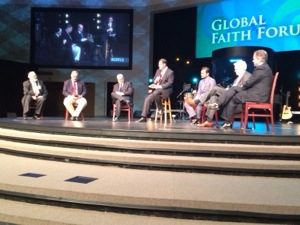 This afternoon’s panel included the following speakers
This afternoon’s panel included the following speakers
They were each asked what their message is. For all of them they wanted to promote peace and understanding between people of faith. As Bob Roberts keeps stressing this does NOT mean that we compromise our faith, nor does it mean that we pretend we agree. Bob keeps saying here that he longs for everybody to follow Jesus.
The challenge is how to we get through the stereotypes. It is really all about love. We must love our neighbor as ourselves. That means respect. That means listening. That means befriending.
Speaking with people from other faiths about Jesus is very helpful for a Christian, dropping religious language and engaging with others about Jesus himself. Speaking about Jesus’ teaching such as the golden rule: “treat other people as you want to be treated” is always attractive to everyone in the world.
Many of us approach sharing our faith by beginning “everything you believe is wrong and let me tell you why.” The largest number of people focussed on the smallest point of agreement gives you the greatest point of impact. Judaism was the faith of Jesus. Islam is a faith with Jesus as a part. Christianity is the faith in Jesus. We can even begin on the things that different religions such as Islam agree about on Jesus. By beginning with agreement we can then move on to areas of disagreement.
When it comes to understanding Israel and their actions, you have to understand history, and the fact that when they put the wall up the suicide bombings became far less frequent.
There is a concern in this room that the Internet encourages us to be angry. Shouting at one another is not the way. You can easily get people excited by yelling. When you decide you don’t want to do that it’s hard to get attention. It is hard not to be biased. None of us can be unbiased. But we can try and be fair. We must quote and summarize their arguments in a way that the others will agree that they have been fairly represented.
We must face the challenge of fear. Because “perfect fear casts out love.” We have to reverse that back to the true Biblical reference which is that when we love someone we are not afraid of them. We must learn to approach people in a loving way. Some of the Christians here have hosted a “love your neighbor dinner” where Muslims were invited and a halal barbecue was enjoyed by all.
It is so concerning for Muslims to try and counter the idea that they are all violent and a threat. Many Muslims believe that all evangelicals want to do is aggressively try to convert them. It is fine to have differences. But we can work on those amicably when we know each other. Since 911 it has not been easy to live in America if you are a Muslim.
We must try to find common ground whether we are talking to someone from another faith or a journalist. In the media we have to try to get positive messages out there. If you walk a mile in someone’s shoes, then the person is a mile away from you and you have their shoes. There is no such thing as a bad question, only an opportunity for a bad answer. Speaking from the depths of your heart is always convincing. Messaging isn’t always so simple, but if you speak from the heart it is so powerful.
Jesus taught exclusive truth claims and modeled universal love.
We must learn to be more humble. We shouldn’t want to fight first.
There are two kinds of messaging. Like messaging and unlike messaging. The architecture of some church buildings are very neutral and if it didn’t say church you wouldn’t realize it was a church. The message is that the building is not unlike an auditorium. To do this you must know your audience. You talk about what you have in common.
Unlike messaging is when you experience something different to what you have ever before. This can blow your mind, and make you stop and think about it deeply. Multi-faith conversations don’t really get interesting until we start talking about differences. Then we can have a meaningful conversation.
Like messaging gets you into a relationship. Unlike messaging develops the relationship.
The most powerful unlike message we have to give people is the lived out reality of our faith.













